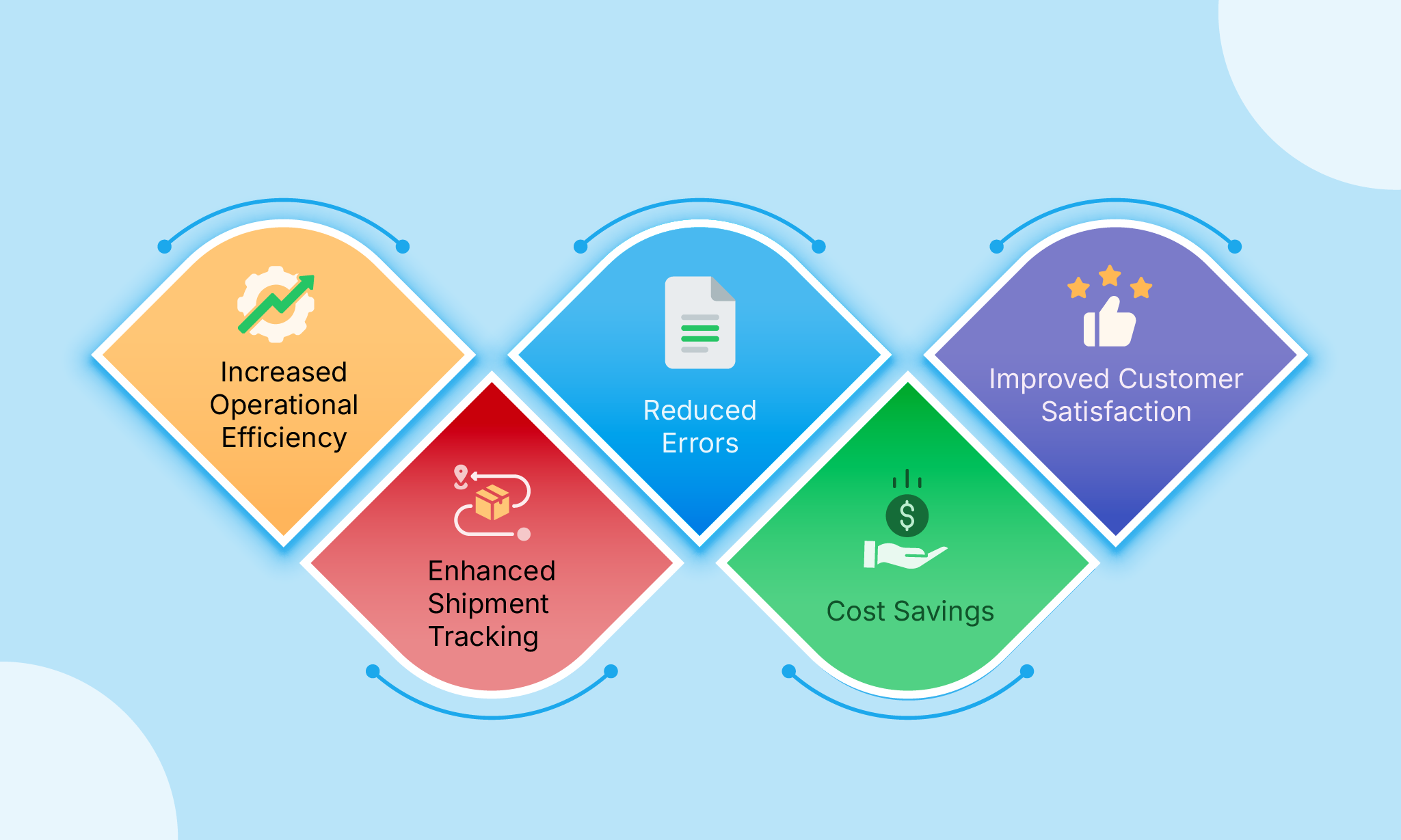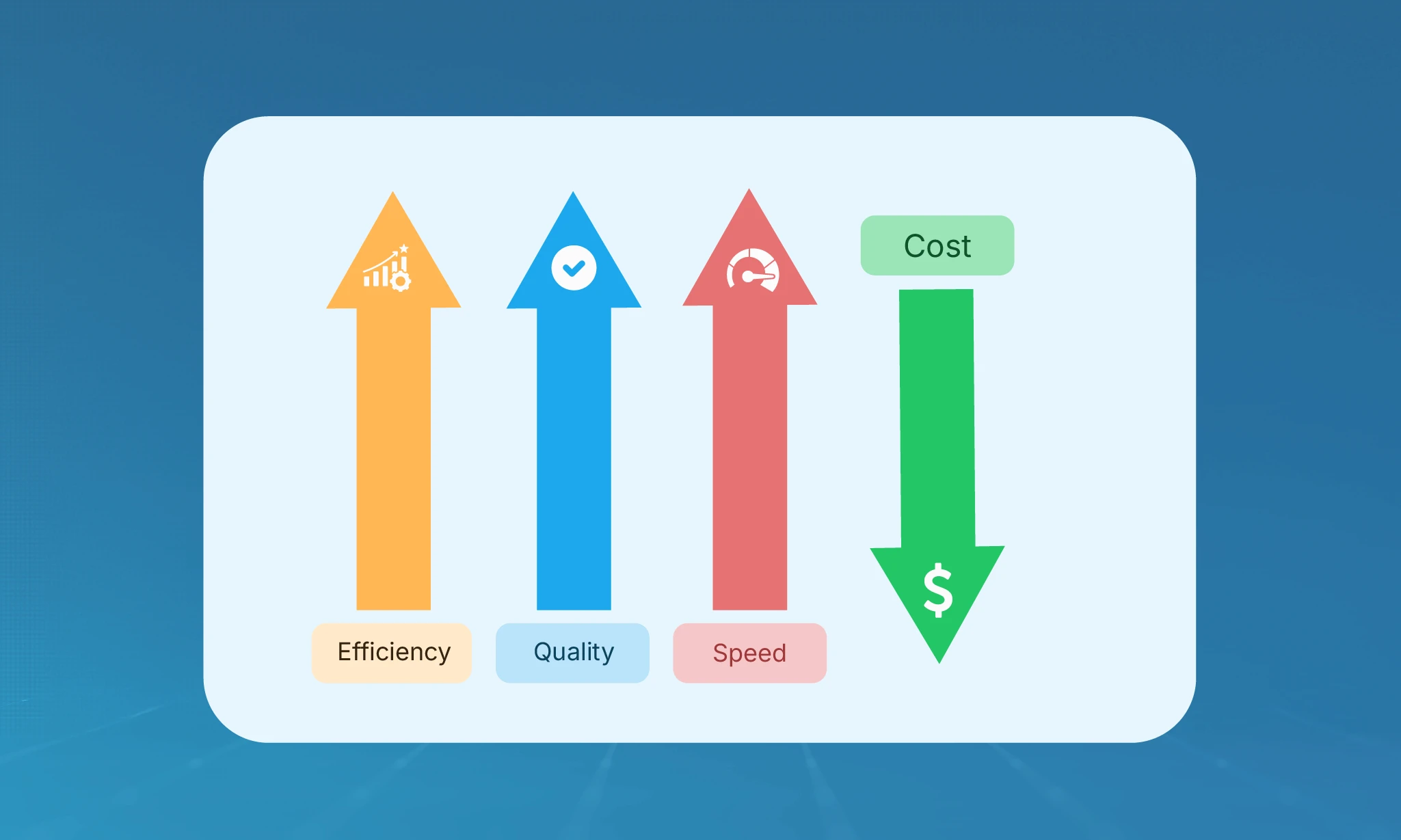What is Freight Forwarding Software?
Author:
Aashinya
Published On:
Oct 9, 2025
1 min read
Freight Forwarding software is a powerful and game-changing tool that empowers B2B business. In the highly competitive world of global trade, efficiency and accuracy can make or break your business. The software tends to simplify the complex shipping process, reduce manual workload, coordinate transportation modes, handle critical documentation, and enhance customer satisfaction.
The blog will explain the requirements of a freight forwarding software, its key features, the benefits of using the software, and how to choose the right one.
What is Freight Forwarding Software?

A digital freight forwarding software is a comprehensive system that automates and integrates various logistics operations. The primary goal of the software is to simplify the complex logistics operations. The software also helps improve transportation and the warehouse management system. Additionally, it reduces the errors that occur due to manual entries and automates all the processes. As a result, all freight forwarding operations will be optimized, and overall customer satisfaction will also improve.
How Freight Forwarding Software Works?
Freight forwarding software works by centralizing all the data from different stages of the shipment process. It also tracks all these shipments in real time and manages all the customs documentation, and facilitates communication between freight forwarders, trucking companies, and other stakeholders. Other advanced features of the often include predictive analytics to anticipate supply chain disruptions, automated workflows to streamline complex processes, and integration with accounting software and business tools to control operational costs effectively.
Key Features of Freight Forwarding Software
The goal of freight forwarding software is to automate the shipping process and keep the customers updated about their shipments. The key features of the freight forwarding software are listed below.
Real-time shipment tracking and inventory tracking for enhanced supply chain visibility.
Automated documentation generation, including commercial invoices and customs paperwork compliant with international trade regulations.
Seamless integration with the existing systems, like transportation management systems and warehouse management systems.
Customer relationship management (CRM) modules that enhance the customer experience and meet evolving customer expectations.
Advanced analytics and reporting tools provide valuable insights, operations, and boosting efficiency.
Cloud-based solutions that ensure data security and accessibility from anywhere.
Benefits for Logistics Companies
Understanding the benefits of freight forwarding software and how it impacts your KPIs in freight forwarding is essential for logistics companies aiming to improve efficiency. Implementing freight forwarding software helps logistics companies with significant cost savings and an improved accuracy in managing freight operations. Additionally, it reduces the reliance on phone calls and manual data entry, which lowers the risk of shipment delays and human errors. It supports freight forwarders in maintaining compliance with international trade regulations and provides a competitive edge in the supply chain industry.
Increased Operational Efficiency
Freight forwarding software automates routine tasks and streamlines workflows. It enables logistics companies to handle multiple shipments at the same time with fewer resources and less manual effort.
Enhanced Shipment Tracking
Real-time visibility is not an advanced feature anymore. It has become a necessity and helps track shipments and allows companies to monitor cargo movement closely. Additionally, it reduces delays and improves communication with customers and partners.
Reduced Errors and Compliance Risks
Automated documentation and integration reduce manual errors. As a result, the penalties due to typos will be reduced, and it ensures compliance with international trade regulations.
Cost Savings
By optimizing routes, reducing manual processes, and improving inventory management, freight forwarding software helps lower operational costs and increase profitability.
Improved Customer Satisfaction

Providing accurate shipment status updates and faster response times enhances the overall customer experience. As a result, customers tend to choose and repeat repeat business.
Who Should Use Freight Forwarding Software?
Freight forwarding software is ideal for all logistics companies, forwarding agents, trucking companies, third-party logistics providers, and any organization involved in managing intermodal shipments or complex logistics operations. The software can be customized to suit each business's needs and is particularly beneficial for companies looking to scale their freight forwarding operations while maintaining control over shipping and operational costs.
Additionally, the freight forwarding software is highly valuable for companies and agents operating in the global market who need to coordinate multiple carriers and transportation modes efficiently. It supports export operations by streamlining customs documentation and compliance, making it easier for businesses to navigate international trade regulations.Small and medium-sized freight forwarders can use modern freight forwarding software to work efficiently and compete with larger companies. Additionally, software upgrades are available as their business grows. The software automates tasks and provides real-time updates on the entire shipping process, reducing the need for manual intervention.
How to Choose the Right Freight Forwarding Software?
It is important to select the right freight forwarding software, as it will lead your business and pave way to profit. There are certain criteria or factors to choose the right freight forwarding software for your business. The preliminary steps involve evaluating the software solution's ability to integrate seamlessly with existing systems. Other factors to look for are real-time visibility, automated workflows, and advanced analytics.
1. Seamless Integration with Existing Systems
A comprehensive freight forwarding software should integrate smoothly with your current freight management system, warehouse management system, and accounting software. It ensures a streamlined workflow across departments, which reduces manual data entry and minimizes errors.
2. Real-Time Visibility and Shipment Tracking
The best freight forwarding software provides real-time visibility into shipments and inventory. As a result, it allows freight forwarding companies to monitor cargo movement closely. This feature helps optimize operations, reduce shipment delays, and improve communication throughout the customer journey.
3. Automation and Advanced Analytics
The software should support automated processes like documentation generation, customs compliance, and workflow management. Additionally, advanced analytics capabilities provide valuable insights to anticipate supply chain disruptions and make data-driven decisions.
4. Scalability and Security
Choose a freight forwarding system that can grow with your business. It should provide features that adapt to evolving supply chain demands and growing business. Data security is very important and should not be compromised. So ensure the software provides robust protection of sensitive information and complies with industry standards.
Cost of Freight Forwarding Software
The cost of freight forwarding software varies depending on the scope of features, number of users, and deployment model. Additionally, the cost also depends on the type of organization, whether it is small-scale or medium-scale.
Most cloud-based freight management software provides flexible subscription pricing. It allows freight companies to invest in modules that align with their operational needs. While upfront costs may vary, the long-term benefits in operational efficiency and cost savings typically provide a strong return on investment.
Conclusion
Freight forwarding software is an essential tool for modern freight forwarding businesses. It aims to optimize their logistics operations and maintain a competitive advantage in the supply chain industry. By automating complex processes, logistics companies can use their manpower to focus on tasks that requires human intervention. Additionally, the software enhances shipment tracking and improves customer relationship management. These software tend to empower freight forwarders to meet increasing customer expectations and navigate the complexities of international trade with confidence.
Frequently Asked Questions (FAQs)
1. What are the primary functions of freight forwarding software?
Freight forwarding software primarily automates and streamlines logistics operations such as shipment tracking, documentation management and other complex processes. It also provides real-time visibility of all the shipments and helps improve customer satisfaction.
2. How does freight forwarding software improve supply chain management?
The freight forwarding software improves supply chain management by providing real-time visibility and updates about the shipments. It also automates documentation, integrates with the existing systems and enhances control over cargo movement and reduces errors and delays in the supply chain.
3. Who can benefit from using freight forwarding software?
Logistics companies, forwarding agents, trucking companies, third-party logistics providers, and any organization involved in managing intermodal shipments or complex logistics operations can benefit. I
4. What features should I look for when choosing freight forwarding software?
The key features to look for when choosing a freight forwarding software are real-time shipment tracking, automated workflows, advanced analytics for predictive insights, scalability to grow with your business, and robust data security measures.
5. How does freight forwarding software help reduce operational costs?
The software optimizes transportation routes, reduces manual processes, improves inventory management, and minimizes human errors. All these factors help reduces operational cost and improves efficiency.
Don't forget to share this blog!



